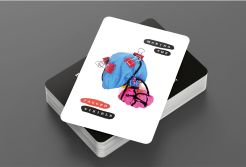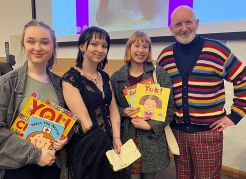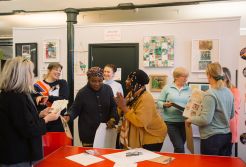10 October 2007
Dyslexia is a 'creative force'
1,500 MMU students dyslexic

Like Picasso, Warhol and Da Vinci they possess a creative force that most of us can only admire.
They are dyslexics and often have an acute visual intelligence that can give them a head-start in the art world.
A week of art in Manchester to co-incide with National Dyslexia Awareness Week (November 5-11) plans to celebrate dyslexic artists and explore dyslexia's links to creativity.
The centre-piece is an exhibition staged by dyslexic artists being held at the Holden Gallery, Manchester Metropolitan University, along with workshops and performances.
UK's commonest disability
Michael Juggins, who is co-curating Dyslexic Artists Dyslexia Action (DADA) believes the country's biggest disability* also offers great opportunities and special gifts to those who are encouraged.
He says: "The lateral and visual strengths that dyslexics naturally possess enable them to succeed in creative field, whether in the arts like Henry Moore or Norman Foster or in inventive businesspeople like Richard Branson or James Dyson.
"DADA simply sees dyslexia as a difference based in how the brain is wired. As creative dyslexics we feel that many wonderful things come hand in hand with the difficulties we experience."
The exhibition, sponsored by the Arts Council for England, will be a multi-sensory experience, showcasing work from hundreds of dyslexics from around the country via multiple computer consoles, as well as fine art painting, photography and sculpture, video and interactive art.
Life changing
All work is original and created around issues relating to dyslexia and the creative process and will be on show from November 3-9.
Among the featured artists is MMU graduate Michelle Oakes, from Oldham, whose life completely turned around after her dyslexia was identified (see case study below).
Mike Juggins, though, says many people are not so lucky: "The vast majority of dyslexics who struggle at school do not go into further education.
"A disproportionate number end up in prison, homeless, unemployed or with mental health and drug problems, so it is important that we seek greater understanding and appreciation of dyslexia."
ends
*An estimated 10% of the UK population has some form of dyslexia. Some 1,500 MMU students dyslexic
CASE STUDY- Michelle Oakes, dyslexic artist
Michelle Oakes left school at 16 an academic failure. Her 'A' in art stood out like a sore thumb and should have told her teachers much more than her teenage words could express. She was dyslexic.
Two degrees later and she is beginning a PhD at Manchester Metropolitan University and co-curating a ground-breaking exhibition with her life turned around.
Her installation at DADA - a huge chess set based on a theme of the eight intelligences - titled Adults on Stilts - challenges our assumptions about the superiority of 'the literate'.
"I was always assumed to be stupid at school because I had trouble understand text. But why if I was so thick did I come top of the class in Art?" she said.
Shattered confidence
Her confidence shattered, Michelle worked in shops, had a child, suffered from depression and ended up in the mental health system, before a social worker pointed her in the direction of City College. She achieved a distinction in Foundation Art and later a first class degree from MMU in illustration and animation.
On completing a Masters in Enterprise degree at MMU, Michelle set up a business in her home town Oldham specialising in photography and portrait painting. She had her first city exhibition '0161' at Urbis in 2006.
"At City College I demanded I be tested for dyslexia and it all started making sense. It was a great relief but it makes me angry to think that all my youth I was going around thinking I was stupid. "
"At MMU my so-called stupid ideas were immediately seized upon as creative and original and the confidence soared through me.
The 34-year-old is co-organising Dyslexia DADA from November 3-9, 2007 at Manchester Metropolitan University.
Contact Michelle at michelle.oakes2@ntlworld.com
Dyslexia DADA runs in parallel with the Dyslexia Symposium at Salford University (5-9 November), which explores dyslexia from an educational and social perspective. See www.salford.ac.uk/events/details/703
If you have dyslexia or think you might be dyslexic, you can get advice and learning support from trained MMU staff. Please go to www.mmu.ac.uk/lsu


